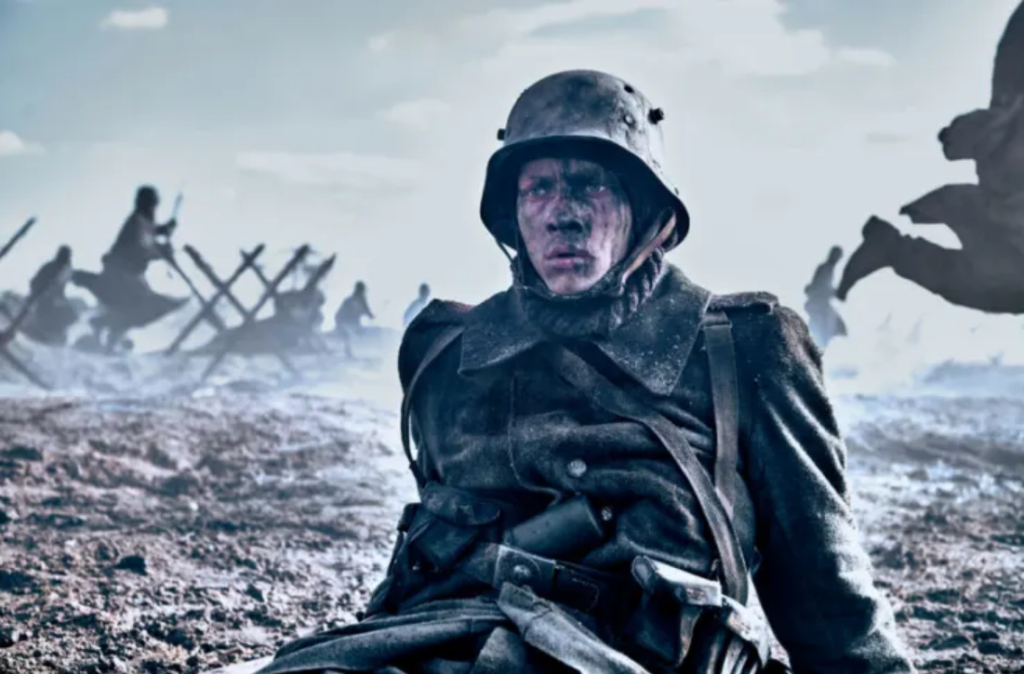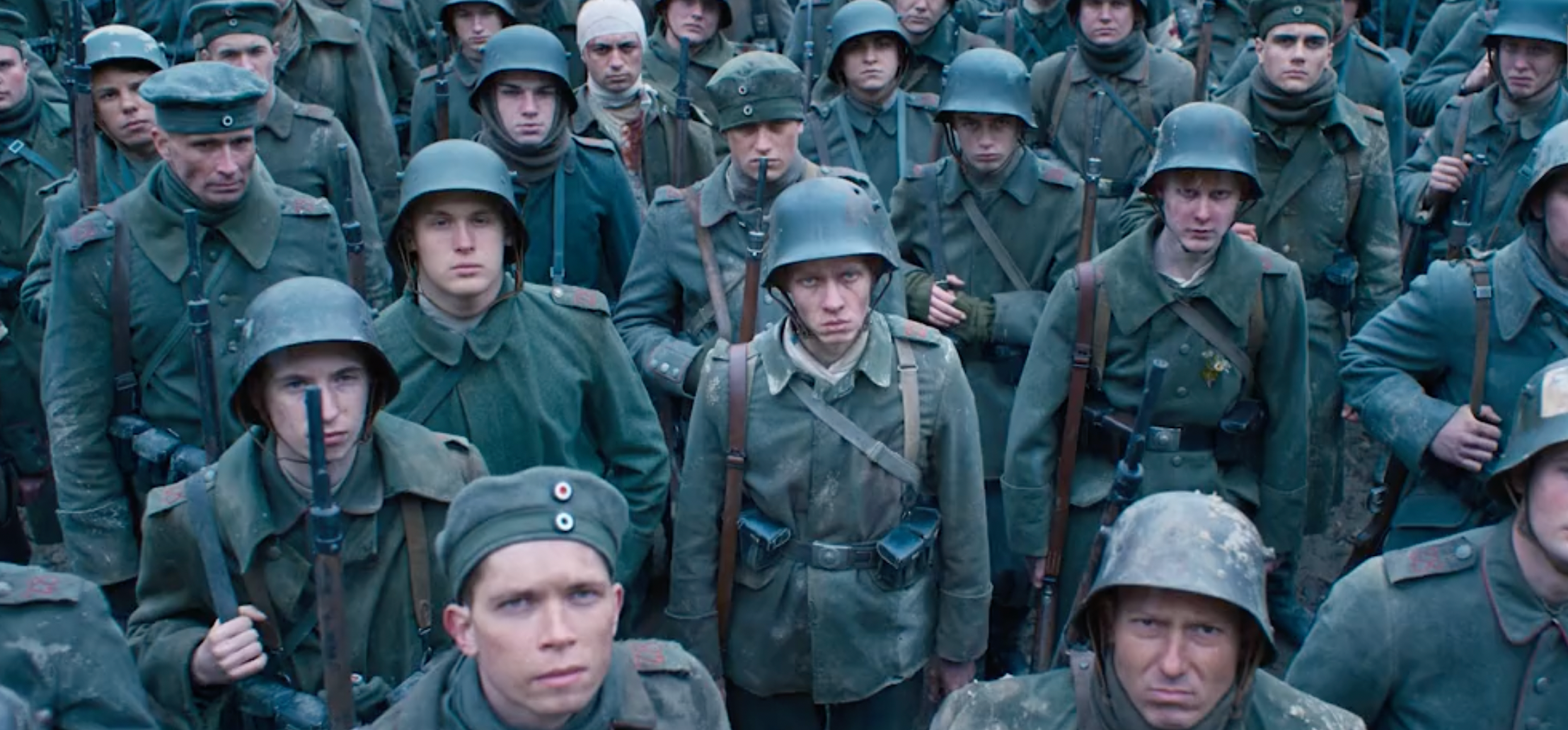War movies have a tendency to valorize and glorify the horrors of combat. It is the unique privilege of the film medium that it possesses the means necessary to create a simulated hellscape and spin a tale of heroism within the grim backdrop for an audience’s entertainment. Usually, this is used to showcase a battle of good versus evil, daring missions executed in the name of honor, brotherhood, moral rectitude, and national pride (think American Sniper, Saving Private Ryan, Black Hawk Down, et al.). The genres of “War” and “Action” are nearly inseparable, and as such, they play by similar rules. On the surface, nearly every war film seems to posit that war breeds bravery and that “good” always prevails. In this way, war films propagandize.
Not so curiously, the diametric opposition to a movie about war that romanticizes the hellish gamut of trials and tribulations is the anti-war film, in which the same tropes and settings are utilized to deliver a significantly different message.
All Quiet on the Western Front, a German-language adaptation of the 1928 novel by Erich Maria Remarche, dehydrates the war film genre of its heroics and injects it with a feeling of total existential futility. While the film is irrefutably a movie about war, its director, Edward Berger, extrapolates the novel’s central anti-war ethos and frames the narrative such that it embodies an antithesis to the glorified heroics depicted in war movies.
The film has modernized the source material’s message for a post-Saving Private Ryan/1917/Call of Duty audience. It is all the more relevant for its portrayal of a country’s population of enlistment-aged men being decimated in a war few want and even fewer understand, as they are led to muddy graves by the hubris and false pride of leaders who never step within shelling distance of the frontlines.
Paul (Felix Kammerer) is a stand-in for the common German soldier. Though he is nearly indiscernible from his fellow mud-smeared and blood-splattered comrades, he is the vessel through which the film’s anti-war message is conveyed. The film begins serene and optimistic as Paul and his schoolmates fake parental consent signatures to enlist, riding the giddy high of camaraderie as they march to the frontlines with a boyish summer camp enthusiasm and flowers pinned to their chests. Fast forward to 18 months later and the war is not going well for Germany. Paul—having witnessed the fatal mutilation of more than one dear friend—has settled into a complacent disillusionment at a reserves camp alongside his fellow soldiers. As a German diplomatic delegation (led by Daniel Brühl) negotiates the terms for their country’s surrender to France, Paul’s regiment is once again called to the frontlines. While the armistice is meant to save the lives of the troops poised to attack, the addition of this “ticking clock” does little to heighten the sense of urgency in the film (especially when compared to Christopher Nolan’s omnipresent, multi-layered hourglasses in Dunkirk), but emphasizes the soldiers’ futility.

In lieu of a conventional arc of action, the film focuses on the war’s human toll, both individual and collective. With little narrative motivation bestowed upon Paul and co., the film assumes a sort of flatlined feeling, as if a happy resolution was never an option. Whether by their own hand or the enemies’, the inevitability of the boys-turned-pawns’ demise is sealed under the command of egotistical military leaders. The ticking clock of the armistice, by the end of the film, underlines the big question inherent in Remarque’s novel: “what was any of this worth?” Ordering a final surge fifteen minutes before the armistice is to begin so that Germany can end the war with a victory—does this justify the casualties incurred?
The sentiments of an anti-war film are not new concepts but are nonetheless vital additions alongside the gung-ho pictures that often lack self-awareness. AQotWF serves more as a recapitulation of a nearly 100-year-old story dished for modern times. The film is about as diverse as you would expect the 1918 Franco-German frontlines to be, and the film’s attempts at humanizing its characters can feel forced and unnecessary within its thematic futility.
As an anti-war film, AQotWF emulates the grisly reality deployed to similar ends in Come and See and (more thematically than in content) The Painted Bird; innocence and humanity are beaten to a bloody pulp under tank treads and mortar shelling, and men are reduced to animals. The film starkly juxtaposes the soldiers’ gruesome experiences against the experiences of those calling the shots, playing war games, and negotiating surrenders while they comment on the lack of fresh pastries in a train dining car and feed their guard dogs meat scraps. (Food is also a recurring motif: the film opens with suckling foxes, and the soldiers’ appetite is mentioned throughout; they are ravenous enough to enjoy raw eggs out of a tin cup, as well as French provisions in a trench mid-attack). What makes AQotWF an effective anti-war film is the way it paints the senseless horrors of such an experience. The film affects the tolls of the war, both mental and physical, rather than romanticize the glory forged in what, at its root, is a massacre fought over a few feet of No Man’s Land, hardly moving the line an inch.
Though the film has been in production since 2020, its release on Netflix coincides with Russia’s mass conscription meant to fuel the ongoing invasion of Ukraine. We need not look any further than a power-hungry despot shrugging off mounting casualties in the name of national pride to find a contemporary, real-world parallel for the film, and consider the notion that war and violence never abate, they only adapt.

Comments